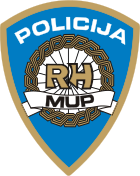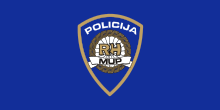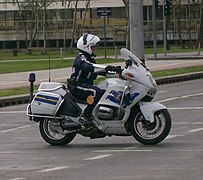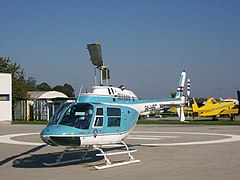Law enforcement agency
| Police Policija | |
|---|---|
 Emblem of the Croatian Police Emblem of the Croatian Police | |
| Agency overview | |
| Formed | 1990 |
| Preceding agency | |
| Employees | 25,670 of which 20,870 are uniformed personnel |
| Annual budget | 4.48 billion HRK (EUR ~600 million or USD ~679 million) |
| Jurisdictional structure | |
| National agency | HR |
| Operations jurisdiction | HR |
| Governing body | Ministry of the Interior |
| General nature | |
| Operational structure | |
| Headquarters | Zagreb, Ulica grada Vukovara 33 |
| Minister responsible | |
| Agency executive |
|
| Police Administrations | 20 |
| Facilities | |
| Airbases | Lučko (LDZL) |
| Helicopters | 9 |
| Website | |
| www | |
Law enforcement in Croatia is the responsibility of the Croatian Police (Croatian: Hrvatska policija), which is the national police force of the country subordinated by the Ministry of the Interior of the Republic of Croatia, carrying out certain tasks, the so-called, police activities, laid down by law.
The Police deals with the following affairs: protection of individual life, rights, security and integrity, protection of property, prevention and detection of criminal offences, misdemeanors, search for perpetrators of criminal offences, violations and their bringing before competent authorities, control and management of road traffic, conducting affairs with aliens, control and security of state border, and other affairs defined by law.
In the operative sense, police affairs are divided into affairs related to public peace and order, affairs related to security of public gatherings, affairs of the border police, affairs of safety of road traffic, affairs of counter-explosive protection, affairs of the criminal police, crime-technical affairs, crime-files affairs, administrative affairs, nationality-related affairs, status questions and asylum, affairs of protection and rescue, inspection affairs and technical affairs.
In recent years, the force has been undergoing a reform with assistance from international agencies, including the Organization for Security and Co-operation in Europe since OSCE Mission to Croatia began there on 18 April 1996, with Croatia being admitted to OSCE on March 24, 1992.
Police powers
Police officers' powers in order to maintain peace in Croatia, such as the power to stop and search, seize property and use force, are regulated. A police officer in Croatia may only stop and search a person if a court has issued a warrant, and it is possible that this person has broken the law or is in possession of items or tools which are considered unlawful.
A police officer is only allowed to use firearms if there is an immediate threat to his own life or the lives of other people, to prevent a crime from being committed for which the minimum prison sentence is five years or more, or to prevent the escape of a prisoner caught committing an offence for which the prison sentence is a maximum of ten years.
Organization

The General Police Directorate (Croatian: Ravnateljstvo policije) is an administrative organization of the Ministry of the Interior constituted for conducting police affairs. The General Police Directorate is responsible for:
- screening and analysis of the state of security and developments leading to the emergence and development of crime;
- harmonization, guidance and supervision over the work of Police Directorates and Police Administrations;
- immediate participation in particular more complex operations of Police Directorates and Police Administrations;
- providing for the implementation of the international agreements on police cooperation and other international acts under the competence of the General Police Directorate;
- organizing and conducting of criminal forensics operations;
- setting the prerequisites for the efficient work of the Police Academy;
- adopting of standards for the equipment and technical means;
- setting the prerequisites for the police readiness to act in the state of emergency.
General Police Directorate is headed by General Police Director (Croatian: glavni ravnatelj policije).
There are the following organization forms within General Police Directorate:
- Police Directorate (Uprava policije)
- Criminal Police Directorate (Uprava kriminalističke policije)
- Border Police Directorate (Uprava za granicu)
- Command of Special Police (Zapovjedništvo specijalne policije)
- Operational Communication Centre (Operativno–komunikacijski centar policije)
- Forensic Centre (Centar za kriminalistička vještačenja)
- Police Academy (Policijska akademija)
- Special Security Affairs Directorate (Uprava za posebne poslove sigurnosti)
For immediate conducting of police affairs there are 20 Police Administrations (policijske uprave) divided into four categories, which cover the territory of the Republic of Croatia according to the organization of units of local self-government (counties or županije).
Police stations are established for direct police and other affairs in each Police Administration.
Border control
Croatia has had an external border with the Schengen area since the accession of the country to the EU. As part of the major migration movements from 2015, Croatia became part of the so-called Balkan route. The European Border Agency Frontex has a small mission in Croatia to assist the police at various border crossings. In July 2018 Frontex organized the air reconnaissance of the border with Bosnia with a reconnaissance aircraft as part of the Frontex 'Multipurpose Aerial Surveillance (MAS). The aircraft transmit moving images of remote sensing cameras in real time to the Frontex Situation Center (FSC) in Warsaw, Poland. In 2023, Croatia became a Schengen Zone member state.
Critics
For several times NGOs report, that the Croatian police illegally and arbitrarily deport refugees to Bosnia-Herzegovina, i.e. from the EU (push-backs). It would come again and again to attacks by the Croatian officials on the refugees.
Working conditions
Croatian police have salaries much lower than the average salary in the country, and has the lowest net wage among all EU countries. For a full-time police officer, the monthly wage amounts approximately to €700; this has been attributed, justly or unjustly, to the declining interest of new candidates at the police academy. Much effort has been invested in media to popularize the profession of law enforcement; absent significant salary increases, however, such efforts have been criticized, before the fact, as futile.
Equipment
Despite having access to Schengen funds and investing significant amount of money in various equipment, it has been claimed that the basic needs of officers are incompletely covered; for example, winter parka jackets are issued to the officer upon initial tour of duty, and in some cases it has been claimed that reissues even after 10 years of service were unavailable.
Ranks
Regular Police (Temeljna policija)
Intervention Police (Interventna policija)

Special Police (Specijalna policija)

Weapons
| Weapon | Origin | Type |
|---|---|---|
| HS2000 | ||
| CZ75 | ||
| Mini ERO | Locally made Uzi copy | |
| Heckler & Koch MP5 | ||
| Heckler & Koch UMP | ||
| Heckler & Koch MP7 | ||
| Heckler & Koch G36C | ||
| Heckler & Koch HK417 |
Equipment
Since 2013, there were special efforts by the Ministry of the Interior to equip the Croatian police with new vehicles and uniforms. Police cars consist mainly of mostly Škoda Octavias, 4-door Opel Astras, some Citroën C-Elysées and, more prominently, Ford Focuses (unmarked sedans and marked estates).
-
Škoda Octavia police car
-
 A motor officer patrolling in Zagreb on a motorcycle
A motor officer patrolling in Zagreb on a motorcycle
-
Water cannon model CVT-6000
-
Mercedes-Benz Vito police van
-
 Cantiere Navale Vittoria V-800HR police boat
Cantiere Navale Vittoria V-800HR police boat
Helicopters
-
 Agusta-Bell 212
Agusta-Bell 212
-
 Bell 206B-3 JetRanger III
Bell 206B-3 JetRanger III
-
 Bell 206B JetRanger II
Bell 206B JetRanger II
| Aircraft | Quantity | Introduced | Notes |
|---|---|---|---|
| Agusta-Bell 212 | 1 | 9A-HBM | |
| Bell 206B | 3 | 9A-HDB, 9A-HBZ, 9A-HBC | |
| AgustaWestland AW139 | 2 | January 2016 | 9A-HRP, 9A-HPH, second delivered on 28 June 2016 |
| Eurocopter EC135 P2+ | 2 | 2013/2022 | 9A-HBA, 9A-HBB, |
| Subaru-Bell 412EPX | 2 | 2024 | 9A-HRC, 9A-HCP |
| Robinson R22 Beta | 1 | 9A-HAG |
Controversies
According to human rights organizations, Croatian police has been accused of overt and, generally unpunished, brutality. Amnesty international has issued a detailed report on the allegations of torture of refugees and migrants, while the Human Rights Watch has criticized the organization impunity of violence and unlawful pushbacks at their borders.
In 2021, the Border Violence Monitoring Network published a report into the use of torture and inhuman treatment during pushbacks by Croatian police. They assert that:
- 87% of pushbacks carried out by Croatian authorities contained one or more forms of violence and abuse that we assert amounts to torture or inhuman treatment
- Unmuzzled police dogs were encouraged by Croatian officers to attack people who were detained
- Croatian officers forcibly undressed people, setting fire to their clothes and pushed them back across international borders in a complete state of undress
Corruption
This section is an excerpt from Police corruption § Croatia. In 2002, accepting bribes was a common form of street police corruption in Croatia. According to the International Victim Crimes Survey, 15 out of 100 respondents reported paying a bribe within the last year – 44% of which were paid to police officers. This frequency was higher than most other East-European countries, with respondents suggesting that police in Croatia were targeted more frequently for successful bribes compared to other countries in East-Europe. These results indicated that police corruption, especially in regards to the acceptance of a bribe by a police officer, seemed to be more prevalent among Croatian police than among police in other East-European countries.See also
- Croatian special police order of battle in 1991–95
- Ministry of the Interior (Croatia)
- USKOK
- United Nations Civilian Police Support Group
Notes
- https://www.mup.hr/public/documents/Financijska%20izvje%C5%A1%C4%87a/Financijski%20plan%20Ministarstva%20unutarnjih%20poslova%20za%202018.g.%20i%20projekcije%20za%20%202019.%20i%202020.%20godinu.pdf
- ^ "Naslovna". mup.gov.hr. Retrieved 2024-01-30.
- ^ "European police and justice systems - Croatia". 2007-05-22. Archived from the original on 2007-05-22. Retrieved 2024-01-30.
- "not found". www.osce.org. Retrieved 2024-01-30.
- ^ "Police, Croatia - Legislationline - free online legislation database". 2007-09-27. Archived from the original on 2007-09-27. Retrieved 2024-01-30.
- "Organizational Scheme" (PDF). interpol.int. Archived from the original (PDF) on 2007-07-14.
- "Naslovna". mup.gov.hr. Retrieved 2024-01-30.
- "Frontex arrests people smugglers in Croatia". 30 November 2018.
- "Croatia police accused of abusing refugees | DW | 16.08.2018". Deutsche Welle.
- "Menschenrechtler beklagen: Kroatien schiebt Migranten nach Bosnien ab - ZDFmediathek". www.zdf.de. Archived from the original on 2018-12-17.
- "Kroatien: Polizei schießt auf Kleinbus mit illegalen Migranten". Die Welt. 31 May 2018.
- "Submachine Gun Type "Ero" cal. 9x19mm > Alan Agency > Product Catalogue". Archived from the original on 2009-10-01. Retrieved 2009-10-22.
- ^ AirForces Monthly. Stamford, Lincolnshire, England: Key Publishing Ltd. March 2016. p. 10.
- ^ "Policija Fleet".
- "Kupuju se helikopteri za civilnu zaštitu".
- "VIDEO: Ministar Božinović: „Ovim helikopterima otvaramo novu stranicu u sustavu zaštite i spašavanja"". mup.gov.hr.
- "Croatia: Fresh evidence of police abuse and torture of migrants and asylum-seekers". Amnesty International. 2020-06-11. Retrieved 2021-11-12.
- "Witness: "If You Scream, They Will Beat You More"". Human Rights Watch. 2021-03-05.
- "Annual Torture Report 2020 – Border Violence Monitoring Network". Retrieved 2021-11-12.
- Ivković, Sanja Kutnjak; Klockars, Carl; Cajner-Mraović, Irena; Ivanušec, Dražen (2002). "Controlling Police Corruption: The Croatian Perspective". Police Practice and Research. 3: 55–72. doi:10.1080/15614260290011336. S2CID 144690458.
External links
| Law enforcement in Europe | |
|---|---|
| Sovereign states |
|
| States with limited recognition | |
| Dependencies and other entities | |
| Other entities | |
| Police forces by country | |
|---|---|
| Africa |
|
| Americas |
|
| Asia and Oceania |
|
| Europe |
|
| states with limited recognition | |
| defunct |
|


















